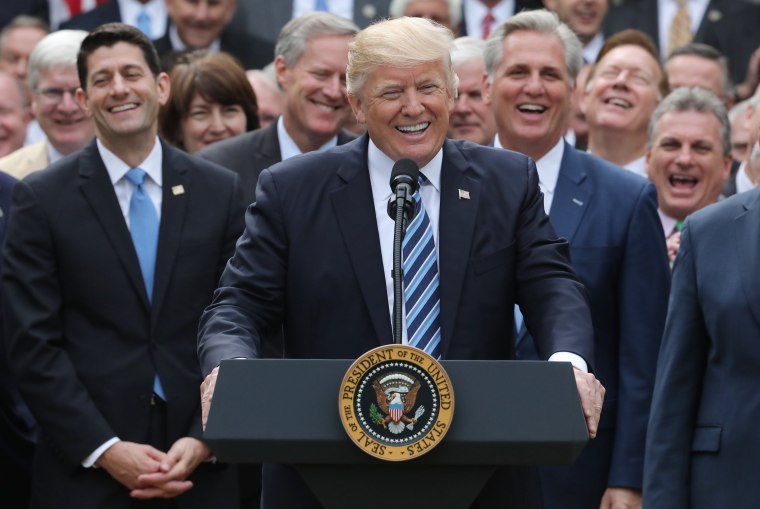The good news for House Republicans is that they won't have to vote again on their far-right health care plan. The bad news for GOP lawmakers is that the Congressional Budget Office's final report on the American Health Care Act shows that the party's plan would be disastrous for much of the country.Here's the key paragraph in the CBO's newly published report:
CBO and [the Joint Committee on Taxation] estimate that, in 2018, 14 million more people would be uninsured under [the House Republican health plan] than under current law. The increase in the number of uninsured people relative to the number projected under current law would reach 19 million in 2020 and 23 million in 2026.
Or put another way, if the House GOP plan became law, the ranks of the American uninsured would jump next year by 14 million Americans. Over the course of the decade, that number would grow to 23 million.Keep in mind, if Congress simply took a sledgehammer to the Affordable Care Act, and replaced it with nothing, the CBO has found that 23 million Americans would lose their health coverage -- suggesting the Republican plan is comparable to doing nothing except destroying without legislating.It gets worse. The new report that because the Republican proposal guts protections for essential-health benefits, people living in affected states "would experience substantial increases in out-of-pocket spending on health care or would choose to forgo the services." This would have a particular impact on those who rely on "maternity care, mental health and substance abuse benefits, rehabilitative and habilitative services, and pediatric dental benefits," who would be forced to pay "thousands of dollars" more than under the ACA.Complicating matters, CBO scorekeepers also found that the Republican legislation, if implemented, would begin destabilizing markets across the country by the end of this decade: "[A]bout one-sixth of the population resides in areas in which the nongroup market would start to become unstable beginning in 2020. That instability would result from market responses to decisions by some states to waive two provisions of federal law, as would be permitted under" the GOP bill.Some on the right will likely cling to the fact that the CBO found that the Republican proposal would eventually reduce premiums, but don't miss the fine print on that seemingly good news: "[A]verage premiums would be lower than under current law because a younger and healthier population would be purchasing the insurance and because large changes to the EHB requirements would cause plans to cover a smaller percentage of expected health care costs."In other words, it eventually gets cheaper for healthy people to buy insurance because there'd be fewer less healthy people in the market.The CBO added, "In addition, premiums would vary significantly according to health status and the types of benefits provided, and less healthy people would face extremely high premiums, despite the additional funding that would be available under H.R. 1628 to help reduce premiums. Over time, it would become more difficult for less healthy people (including people with preexisting medical conditions) in those states to purchase insurance because their premiums would continue to increase rapidly."This might have been useful information for House members to have before they voted three weeks ago. Indeed, it was difficult not to appreciate the irony this afternoon. Those most invested in the health care debate today did what Republican lawmakers refused to do: learn about the real-world effects of the GOP legislation.Remember, House Speaker Paul Ryan and his GOP allies could've waited for the Congressional Budget Office to issue a report on the legislation before they voted on it, but Republicans chose willful ignorance: they didn't want to know what their bill would cost -- and they didn't want to know how many Americans would lose their health security -- because the more facts policymakers had at their disposal, the more likely it would have been their bill would fail.And now 217 House Republicans are on the hook, voting for legislation first, then learning they voted to take health security away from 23 million Americans.
